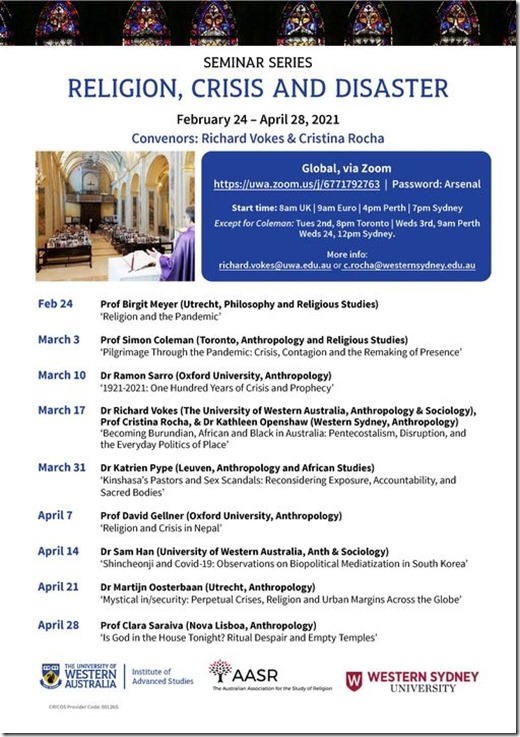UK – 2021 Implicit Religion, Race, and Representation
Call for Papers
Deadline for submissions is 15 March, 2021
This online only conference takes place against the backdrop of increased political authoritarianism and a noticeable rise in racial and religious intolerance across the world. Politicians are actively seeking to prevent teaching on critical race theory, colonial brutality and the ongoing legacy of enslavement. Concurrently we increasingly find ‘race’ being dismissed or diminished as a category of oppression within wider social problems and dynamics, at the expense of understanding the lives, cultures, and histories of Black people, Indigenous people and people of colour. To understand how assertions of identity function at the same time as racism, nationalism, and exclusion we need to view these developments as intertwined with religion and in the development of definitions of religion and religiosity. The ongoing Black Lives Matter protests, the burning of the Amazon, attempts to lay pipelines in North Dakota, conducting scientific experiments on indigenous sacred lands and responses to other acts of neo-colonialism might be productively analysed in terms of race, religion, and implicit religion.
Presenters are invited to submit abstracts for consideration on the theme of “Implicit Religion, Race, and Representation”. These might include, but are not limited to:
- Presence, absence, and resistance in representations of race
- New social movements, resistance, and counter movements (civil rights, indigenous rights, anti-apartheid movements, Black Lives Matter, Say Her Name etc.)
- Womanist analysis, thinking, being, and doing
- Agency and social otherness
- Embodying and embracing difference
- Technologies (visual, material, and sound) and racial categories in culture memory and the formation of identity
- Racialisation of religion and religious racism
- Methodologies for decolonising teaching and curricula in the study of religion
- Political and religious authoritarianism: past, present, and future
CFP PDFs
A4 IR UK 2021 CFP | Ltr IR UK 2021 CFP
Proposal Submissions
We invite submissions for proposals for either a paper or a scratch session on these themes, elaborated above, by the 15th March 2021 for #IR43, taking place online May 21st – 23rd 2021.
The submission form is now available. You will be asked to indicate if you are submitting a paper or scratch session, and to provide a 300 word abstract (with references to secondary literature and sources) and other information as specified below, and what we need to know in order to accommodate your participation if your proposal is accepted.
Please note while you can edit your entries before you select the submit button, the form does not allow the submission to be saved and edited later. We suggest looking at the form for context and then composing the abstract and the notes regarding accommodating your participation in a word processing document and then cutting and pasting these elements of the proposal into the form.
PAPERS
Please select the option “Paper” on the form. Those submitting papers are asked to submit an abstract of no more than 300 words.
SCRATCH SESSIONS
There will be a dedicated panel for advanced undergraduates, MA and early stage PhD students to present at – called a scratch session. These will be shorter papers and rather than the usual practise of asking questions of the presenters, the audience will make suggestions for further reading, pathways for improvement, scholars to explore etc. If you wish to apply for the scratch session, please select that option on the submission form and submit a 200–250 word abstract.
Keynote
The 2021 Edward Bailey Lecture, “Designing for Humans, Designing Research on Human Subjects: Race, Representations, and Rights” will be delivered by Dr Ipsita Chatterjea, Executive Director of the Study of Religion as an Analytical Discipline Workshop.
Workshop
A workshop on decolonising the curriculum, with an emphasis on religious studies will be delivered by Dr Malory Nye.
Please note we are a small organisation and as such are not in a position to provide bursaries for participation. We can provide you with an official letter of invite and a subsequent letter of participation if your university or funding body requires it.


